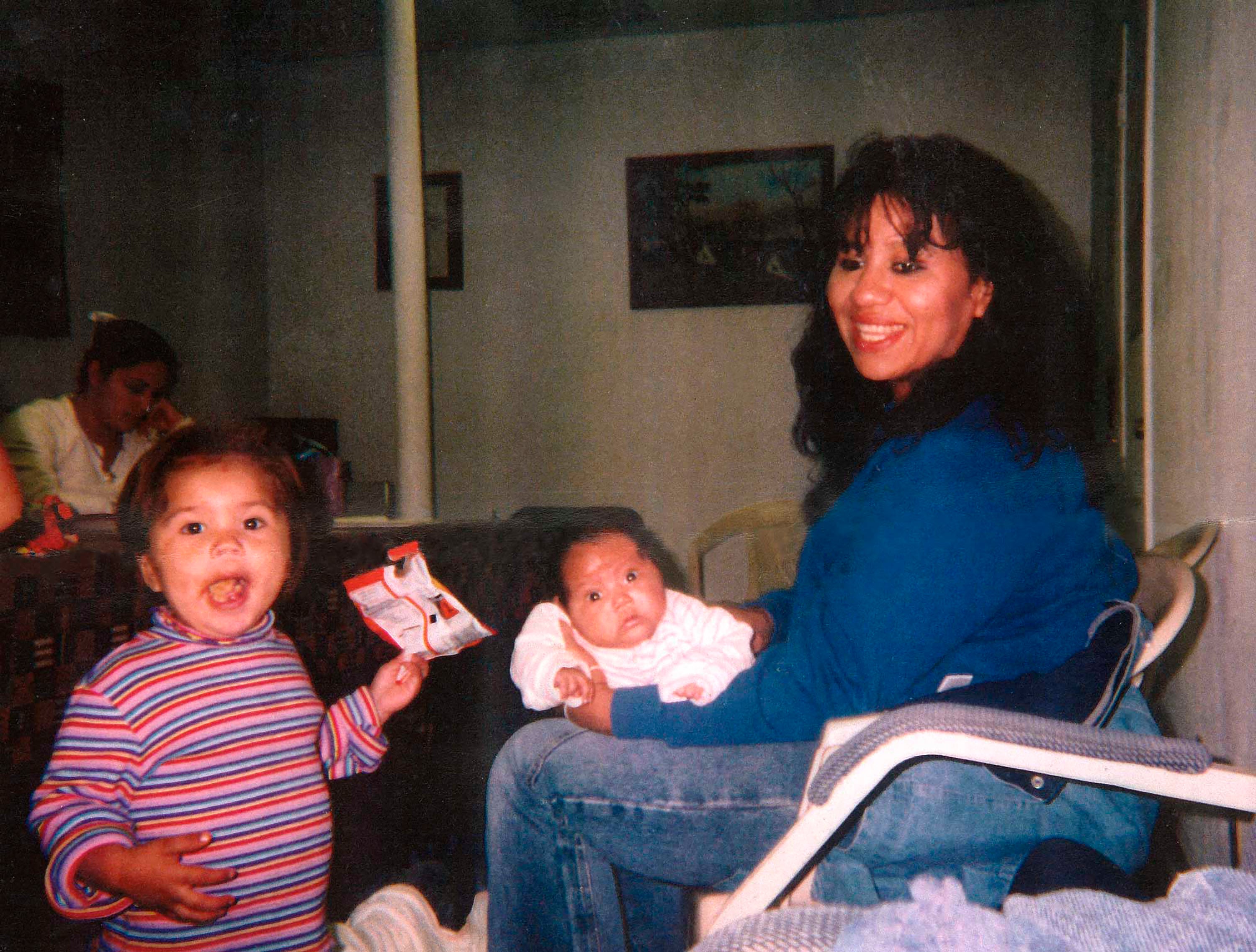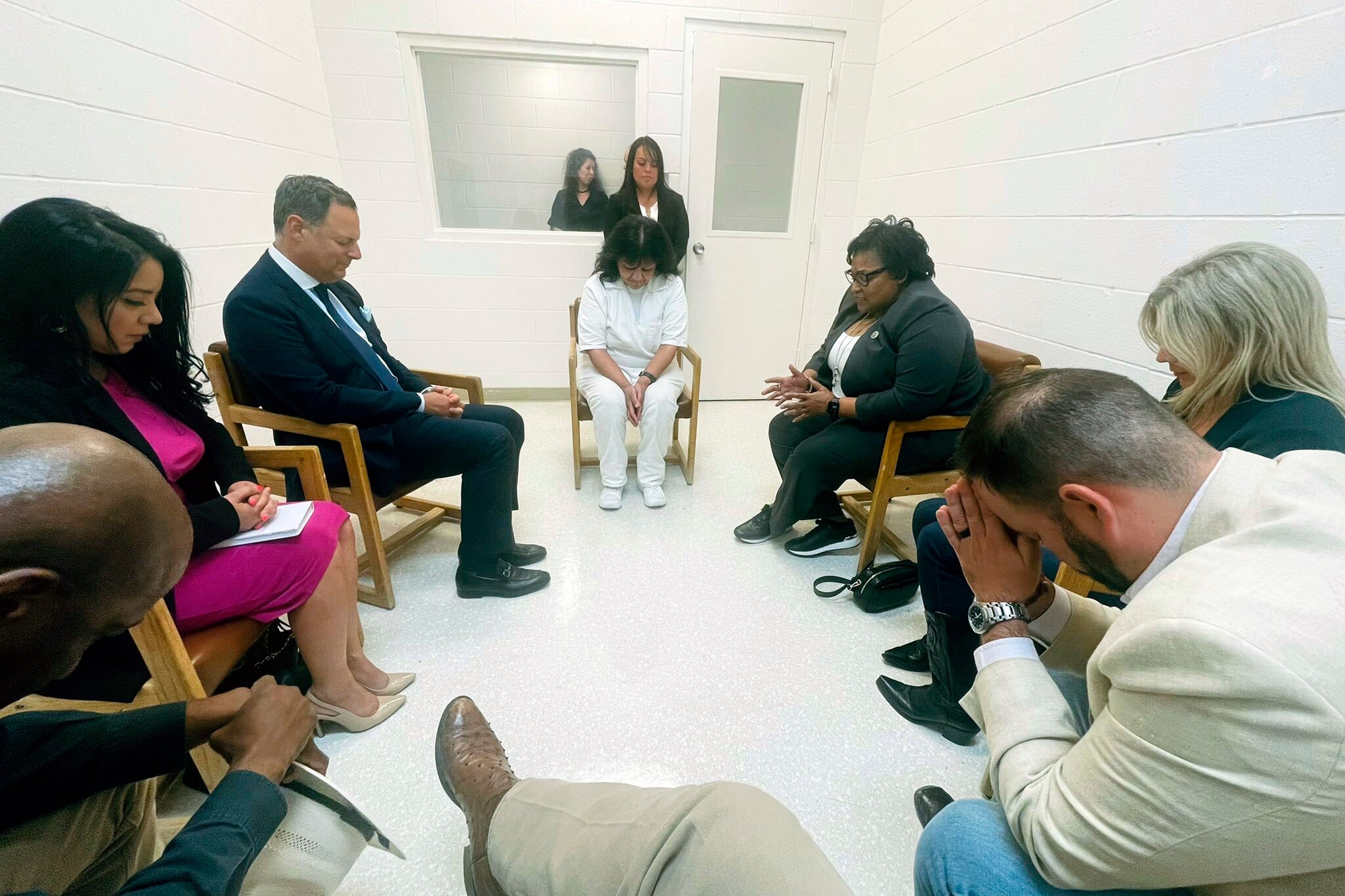
Amanda Knox has joined in calls to stop the looming execution of Melissa Lucio, a Texas mother of 14, saying that she wishes she could “welcome her into our exoneree family”.
Ms Knox, 34, shared a Medium post about Lucio’s case on Tuesday night as the 53-year-old Hispanic woman is now just one week away from being put to death by the state of Texas for a crime she says she didn’t commit.
In the post, Ms Knox compared her own wrongful conviction in Italy for the murder of her British roommate Meredith Kercher to the conviction of Lucio for the murder of her two-year-old daughter Mariah.
She spoke about both of their experiences of motherhood and hit out at the different treatment of men and women within the criminal justice system as she said real justice would not only be saving Lucio from execution but her walking out of prison a free woman.
“Merely refraining from killing Melissa Lucio will not be justice,” she said.
“Justice, at the least the beginning of justice, would be an exoneration and immediate release from custody.
“Justice would be seeing Melissa at next year’s Innocence Network Conference, where she would find, as I did, that she isn’t alone.”
Lucio, a victim of lifelong domestic violence, was sentenced to death in 2008 for the murder of her daughter Mariah in 2007, after prosecutors claimed the two-year-old died from her mother physically abusing her.
For the last 14 years, Lucio has insisted she is innocent – and that no murder even took place – with her daughter sadly passing away from injuries caused by a fall down a flight of stairs two days earlier.
Her attorneys say that the only evidence to convict Lucio was a false “confession” as the pregnant and grieving mother was subjected to an aggressive five-hour interrogation by armed, male police officers in the hours after her daughter’s sudden death.
During the interrogation, Lucio asserted her innocence more than 100 times to the officers, according to the clemency application from her legal team.
But, because of her history as a victim of sexual abuse and domestic violence and the actions of the male officers who “manipulated” her, she was vulnerable to their “coercion”, her attorneys said.
After five hours, Lucio ended up admitting that she sometimes spanked Mariah and caused some bruising on her daughter’s body – an admission that prosecutors took as a confession for her murder.
With her execution date looming on 27 April, medical experts, false confession experts, a bipartisan group of state lawmakers and even Kim Kardashian have rallied behind Lucio’s case, calling for her execution to be halted and for her to be – at the very least – granted a new trial.

Ms Knox, who regularly speaks out about wrongful convictions following her own exoneration, has now become the latest public figure to come out in support of the Texan mother.
In her Medium post, Ms Knox wrote that accidents can be “a rite of passage” of motherhood, describing a moment where her daughter Eureka fell from a couch and she felt “like the worst mother in the world”.
“A few months ago, in that blurry haze of new motherhood, I left my infant daughter Eureka on the couch for just a few seconds. She rolled and slipped and tumbled to the floor, hitting her head, then burst out crying,” she said.
“I held her against my chest, crying myself, trying to calm her, feeling like the worst mother in the world. My mom reassured me that I’d hit my own head in the exact same way more than once. And sure enough, Eureka was fine. Not even a bruise.”
She said that her experience is one many parents go through with no lasting impact to the child or the parent “unless you’re Melissa Lucio”.
“It’s a rite of passage, I learned, the first time your child falls, that first moment of parental negligence, that first jolt of unexpected pain that shocks them (and you) into tears,” she said.
“But an hour later, they’re okay and you’re okay, and life goes on. Unless it doesn’t.
“Unless you’re Melissa Lucio, whose daughter died from just such an accident, whom the state of Texas plans to execute on April 27th for a crime that never even occurred.”
Ms Knox went on to highlight the differences between men and women who are wrongfully convicted of crimes.
“When men are wrongfully convicted, there’s usually an obvious crime, blood and trauma, a grieving victim’s family. The police and prosecutors just got the wrong person, and somewhere out there, the real rapist or killer may be causing more harm,” she wrote.
“But when women are wrongfully convicted, in nearly 70 per cent of cases it’s for crimes that never occurred — deaths by accident, disease or suicide, and in nearly a third of cases, it’s for the deaths of their own children or children in their care.
“With women, most often, the grieving family is their own.”
She also pointed to the prevalence of false confessions, particularly among those who are vulernable.
“In my case, I was 20, alone in a foreign country, thousands of miles from home, being interrogated in a foreign language. My roommate had just been senselessly and brutally murdered, the killer was on the loose, and I had no one to turn to for help,” she said.
“No one but the police. And over 53 hours in five days, they broke me.”

In Lucio’s case, she was especially vulnerable after suffering a lifetime of sexual and physical abuse at the hands of men, said Ms Knox.
“After five hours of psychological abuse, Melissa Lucio did what many people do in that situation: she said whatever they wanted her to say to get out of that room,” she wrote, adding that her escape from her latest abusive relationship was “into the abusive arms of the state of Texas”.
The “more vulnerable they are, the easier it is for police” to elicit a false confession, explained Ms Knox, admitting that she understands that many people think “‘I would never confess to something I didn’t do’”.
“I certainly thought that before I found myself in an interrogation room,” wrote Ms Knox.
Ms Knox was a 20-year-old Seattle college student on placement in Perugia, Italy, in 2007 when her British roommate Ms Kercher was brutally sexually assaulted and murdered in their apartment.
Ms Knox and her then-boyfriend Raffaele Sollecito were charged and convicted of her murder and spent four years in prison, before being acquitted and released on appeal.
The pair were then convicted of Ms Kercher’s murder again before finally being exonerated by Italy’s Supreme Court in 2015.
Meanwhile, a known burglar Rudy Guede was arrested and convicted of Ms Kercher’s murder.
The case captured headlines across the globe and is often held up as a benchmark case of both a wrongful conviction and trial by media, as Ms Knox was famously branded with the nickname “Foxy Knoxy”.
Following Ms Knox’s release and return to the US, she said she attended the annual Innocence Network Conference with her mother and two men ran up to her.
“They hugged me, and one of them said, ‘You don’t have to explain a thing, little sister. We know.’ I cried in their embrace. These were men who’d each spent over a decade in prison for crimes they hadn’t committed,” she wrote in the Medium post.
“By the end of that weekend, I had a new family.”
Ms Knox wrote that she wishes she could hug Lucio and “do the same” for her.
“I wish I could do the same for Melissa Lucio,” she said.
“I wish I could meet her on the other side of those double doors in a hotel ballroom and welcome her to our exoneree family, and say, ‘You don’t have to explain a thing, sister. We know.’”
The Independent and the nonprofit Responsible Business Initiative for Justice (RBIJ) have launched a joint campaign calling for an end to death penalty in the US. The RBIJ has attracted more than 150 well-known signatories to their Business Leaders Declaration Against the Death Penalty - with The Independent as the latest on the list. We join high-profile executives like Ariana Huffington, Facebook’s Sheryl Sandberg, and Virgin Group founder Sir Richard Branson as part of this initiative and are making a pledge to highlight the injustices of the death penalty in our coverage.







